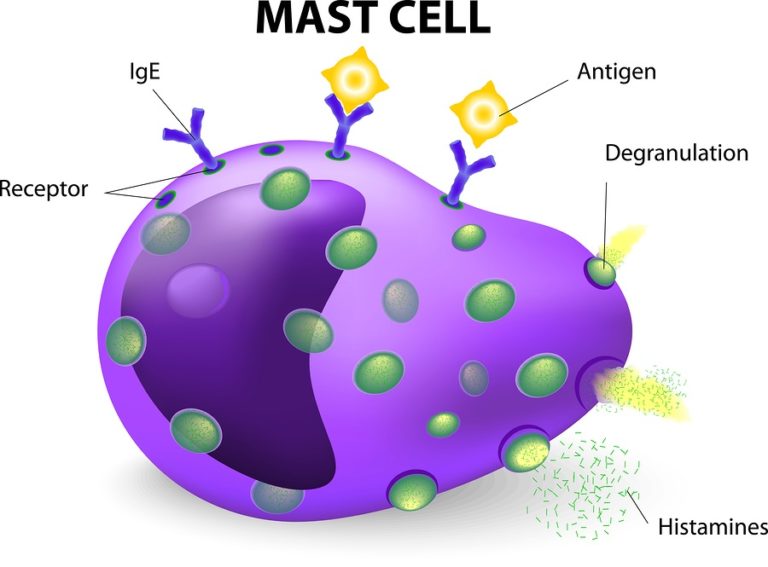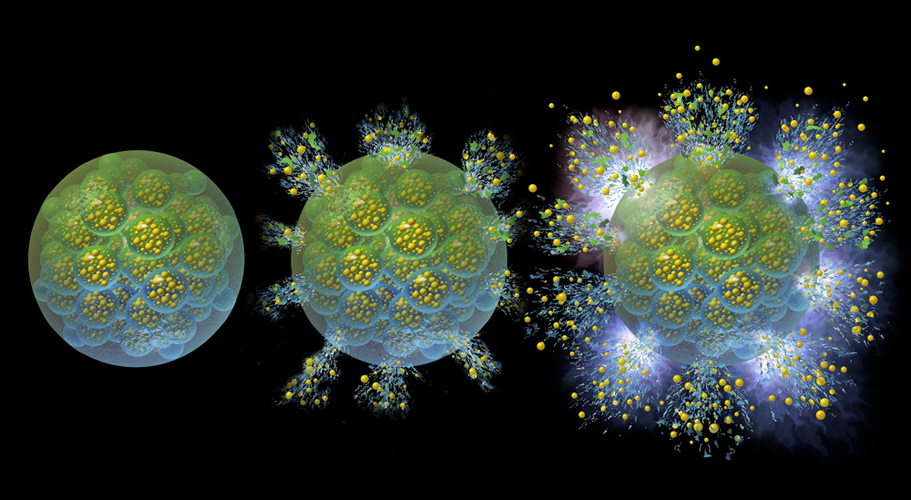
Mast Cell Activation Syndrome (MCAS) is a condition that affects various parts of your body, but it can be hard to understand and diagnose. Let’s break it down so it’s easier to grasp.
Firstly, there are different types of mastocytosis, which is related to MCAS. Systemic mastocytosis often impacts adults and affects more than one part of the body. On the other hand, cutaneous mastocytosis usually affects just the skin and is more common in children (1).
Mast cells are crucial players in our immune system. They help fight off germs and play a part in allergic reactions. When you have an allergic reaction, it’s often because your mast cells are reacting to something they think is harmful. In MCAS, these mast cells are either too active or there are too many of them, causing symptoms similar to allergies (2).
One key protein in this process is tryptase, which comes from mast cells. High levels of tryptase can be a sign of mastocytosis. If your doctor finds elevated tryptase levels, they might recommend a bone marrow biopsy to confirm the diagnosis (3).
Interestingly, mast cells also help maintain a healthy balance of bacteria in our gut, which is important for overall health (4). However, when mast cells are overactive, as in MCAS, they can cause a range of symptoms since they are present in almost every tissue in the body.
Diagnosing MCAS can be tricky. Often, blood tests might not show anything unusual, so doctors usually suggest repeating these tests when symptoms appear (5). Treatment often involves avoiding triggers and using medications to control the disease. Medicines like cromolyn and ketotifen are known to help reduce symptoms (6).
Currently, there is no cure for MCAS, but that doesn’t mean it can’t be managed. Connecting with others who have the same condition can be a big help (7).
MCAS symptoms can affect many body systems including the heart, stomach, lungs, nerves, and skin. It’s important to treat these symptoms not just to feel better, but also to help find the cause of MCAS (8).
It’s worth noting that MCAS symptoms can be similar to those of other conditions like myalgic encephalomyelitis (ME), so it’s possible to have more than one diagnosis (9). A skin biopsy can sometimes confirm the diagnosis.
If you have MCAS, you’ll likely try different medications to find what works best for you. It’s a process that requires patience but can lead to significant improvement (10). Remember, it’s important to work with a knowledgeable doctor, like an allergist or immunologist, who is familiar with MCAS testing and treatment (11).
Lastly, diet can play a role too. Some people find that limiting foods high in histamine helps reduce symptoms (12). It’s best to work with a healthcare provider who understands which antihistamines are most effective for your situation.
In summary, MCAS is a complex but increasingly recognized condition. It can affect almost any part of the body and requires a patient and systematic approach to manage effectively.
References:
- “Mastocytosis.” Mayo Clinic. Mayo Clinic Mastocytosis
- “Mast Cells.” The American Academy of Allergy, Asthma & Immunology. AAAAI Mast Cells
- “Tryptase Test.” MedlinePlus. MedlinePlus Tryptase Test
- Galli, Stephen J., et al. “Mast cells and the development of allergic disorders.” Annals of Medicine, 37(2), 2005, 98-117. Annals of Medicine
- “Mast Cell Activation Syndrome.” Genetic and Rare Diseases Information Center. GARD MCAS
- “Mast Cell Stabilizers.” Cleveland Clinic. Cleveland Clinic Mast Cell Stabilizers
- “Living with MCAS.” The Mastocytosis Society. TMS Living with MCAS
- Afrin, Lawrence B. “Presentation, diagnosis, and management of mast cell activation syndrome.” In Mast Cells, 2013, 155-232. Springer, New York, NY. Springer Mast Cells
- “Myalgic Encephalomyelitis.” Centers for Disease Control and Prevention. CDC ME
- Akin, Cem, and Peter Valent. “Mast Cell Activation Syndrome: Proposed Diagnostic Criteria.” The Journal of Allergy and Clinical Immunology, 126(6), 2010, 1099-1104.e4. JACI Mast Cell Activation Syndrome
- “Allergist / Immunologists: Specialized Skills.” American Academy of Allergy, Asthma & Immunology. AAAAI Allergist Skills
- “Histamine Intolerance.” American Academy of Allergy, Asthma & Immunology. AAAAI Histamine Intolerance


